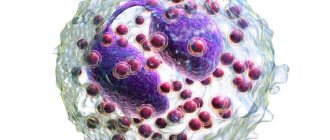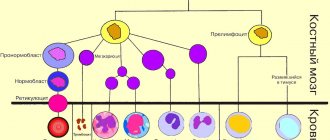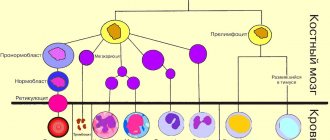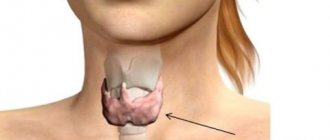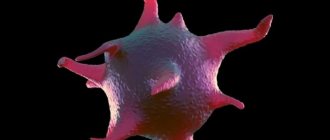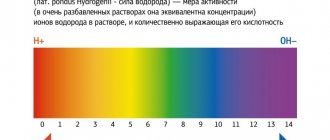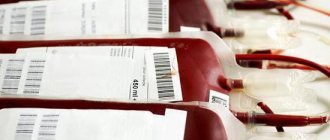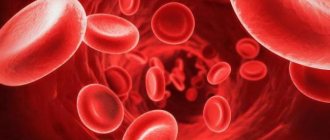Gastritis
Pancreatitis
Worms
517 January 20
IMPORTANT!
The information in this section cannot be used for self-diagnosis and self-treatment.
In case of pain or other exacerbation of the disease, diagnostic tests should be prescribed only by the attending physician. To make a diagnosis and properly prescribe treatment, you should contact your doctor. We remind you that independent interpretation of the results is unacceptable; the information below is for reference only.
Vitamin B12: indications for prescription, rules for preparing for the test, interpretation of results and normal indicators.
Indications for the purpose of the study
Vitamin B12 is the common name for two chemical variants of the cobalamin molecule (cyanocobalamin, hydroxocobalamin), which are converted into active compounds in the body.
Sometimes vitamin B12 is understood as a combination of the four most studied forms of chemical varieties of cobalamin containing cobalt (cyanocobalamin, hydroxocobalamin, methylcobalamin, adenosylcobalamin).
In the literature, vitamin B12 usually means cyanocobalamin, since it is in this form that a significant part of vitamin B12 enters the human body.
The vitamin B12 molecule is the largest of all vitamin molecules and the only one in living nature that contains a metal atom (cobalt).
Vitamin B12 is the only vitamin that is synthesized in nature exclusively by microorganisms and deposited in the liver.
Cyanocobalamin enters the human body with food of animal origin, and its main sources are animal liver, fish, eggs and dairy products. Vegetables and fruits do not contain vitamin B12.
Cobalamin levels depend on how much of the vitamin comes from food, how much is excreted, and how much is consumed by the body.
With a balanced diet, a person receives from 5 to 15 mcg of vitamin B12 daily. The daily requirement for vitamin B12 for adults is from 2 to 3 mcg/day, for children – from 0.3 to 1.4 mcg/day. During pregnancy and lactation, the body's daily need for vitamin B12 increases to 7.6 mcg/day. After the cessation of vitamin intake into the human body, its deficiency (up to anemia) develops over several years. The incidence of vitamin B12 deficiency in the age group over 60 years is 40%.
Absorption of cobalamin occurs in the intestine in the presence of a specific enzyme - intrinsic factor of Castle, which is synthesized by the cells of the gastric mucosa. Vitamin B12 supplied with food binds to this enzyme, and the resulting complex interacts with the receptors of the cells of the ileal mucosa. During absorption, the complex disintegrates - vitamin B12 penetrates through the wall of the small intestine into the bloodstream, where it binds to a transport protein that delivers it to consumer cells. Unclaimed cobalamin accumulates in reserve - mainly in the liver, but also in the spleen, lungs and kidneys.
Vitamin B12 is involved in the maturation of red blood cells, in the processing of homocysteine, the metabolism of folate, vitamin D, cholesterol, etc. Thanks to vitamin B12, blood cells, mucous membranes, and skin are renewed.
With vitamin B12 deficiency, an ineffective type of hematopoiesis develops: red blood cell precursor cells grow but do not divide, resulting in the formation of small numbers of giant red blood cells. Megaloblastic anemia develops.
Vitamin B12 deficiency causes changes and damage to neurons in the brain and spinal cord, which can result in physical, neurological and mental disorders.
In medicine, cyanocobalamin is used to treat anemia, polyneuritis, multiple sclerosis, radiculitis, and normalize lipid metabolism. It has been established that the administration of high doses of the vitamin significantly reduces the progression of atherosclerosis in the early stages of the process. In pediatrics, vitamin B12 is used to treat low birth weight newborns.
The use of B vitamins can reduce the content of homocysteine in the blood, which damages the walls of blood vessels, making their surface loose. Cholesterol and calcium are deposited on the damaged surface, forming an atherosclerotic plaque. Elevated homocysteine levels increase the risk of thrombosis. For a 2.5 μmol/L increase in plasma homocysteine levels, the risk of myocardial infarction increases by 10% and the risk of stroke by 20%.
Thus, the following indications are distinguished for determining the level of vitamin B12:
- diagnosis of anemia;
- diagnosis of vitamin B12 absorption disorders;
- monitoring vitamin levels during a strict vegetarian diet;
- diagnosis of congenital forms of vitamin B12 deficiency;
- monitoring the level of vitamin B12 during the treatment of neurological and mental diseases, in oncological practice;
- age over 50 years;
- after surgical interventions on the gastrointestinal tract (gastrectomy, extensive resections of the small intestine).
Interpretation:
- Chronic renal failure, severe congestive heart failure, elevated transcobalamin levels, liver disease, acute and chronic myeloid leukemia, monocytic leukemia, erythroleukemia.
- Vitamin B12 deficiency. The main causes: atrophic gastritis, gastrectomy, stomach cancer, gastric polyposis, malabsorption syndrome, small intestinal cancer, chronic pancreatitis with impaired trypsin secretion, infestation with a broad tapeworm, whipworm.
Sample result (PDF)
Preparation for the procedure
- It is recommended to donate blood in the morning from 8 to 11 o’clock, on an empty stomach (at least 8 hours of fasting), you can drink water as usual.
- Agree with the doctor who ordered the test on the list of medications you are taking that may affect the test result.
- Avoid drinking alcohol on the eve of the test and do not smoke for 1 hour before the test.
- Avoid physical and emotional stress the day before the test.
- It is not advisable to donate blood for laboratory testing soon after physiotherapeutic procedures, instrumental examination and other medical interventions.
- When monitoring laboratory parameters over time, it is recommended to conduct repeated studies under the same conditions: in the same laboratory (using the same method) and at approximately the same time of day.
Vitamin B5
Pantothenic acid (vitamin B5) has a stress-protective effect and is part of coenzyme A, which takes part in the metabolic processes of proteins, fats, and carbohydrates.
Vitamin B5 is necessary for the synthesis of vital substances such as hemoglobin, cholesterol, histamine, acetylcholine. In addition, it activates the synthesis of glucocorticosteroids (adrenal hormones), which have immunoregulatory, antiallergic, and anti-inflammatory effects. It is important to understand that without pantothenic acid, other vitamins are poorly or not absorbed at all. Mackerel, sardines, tuna, sweet bell peppers, and pine nuts will help you add a portion of the vitamin to your diet.
Main symptoms of vitamin B5 deficiency
- fatigue, weakness, apathy;
- the appearance of a burning sensation in the toes, often numbness;
- with a severe deficiency, “burning feet” syndrome occurs - excruciating pain in the legs at night.
With a lack of pantothenic acid, the production of gastric juice decreases, heart function worsens, neuritis develops, and the risk of developing skin diseases and duodenal ulcers increases.
Causes of Vitamin B5 Deficiency
- long-term malnutrition (food poor in proteins, fats, vitamin C and B vitamins);
- suppression of intestinal microflora, including long-term use of antibiotics and sulfa drugs;
- intestinal diseases of various nature.
To promptly identify pantothenic acid deficiency, go to CITILAB study 95-10-202 - Vitamin B5 (pantothenic acid).
What else is prescribed with this study?
B vitamins (B1,B2,B3,B5,B6,B9,B12)
4.23.1. Ven. blood 7 days
13 140 ₽ Add to cart
Homocysteine
1.53. Ven. blood 1 day
1,890 ₽ Add to cart
Complete blood count without leukocyte formula (venous blood)
3.1.1. Ven. blood 1 day
330 ₽ Add to cart
Folates
4.3. Ven. blood 1 day
1 100 ₽ Add to cart
References
- Demikhov, V.G., Skobin, V.B., Zhurina, O.N. and others. Federal clinical guidelines for the diagnosis and treatment of anemia caused by B12 deficiency, 2014. - 8 p.
- Clinical oncohematology: a practical guide / ed. M.A. Volkova M.A., 2001. -576 p.
- Arthur, C., John, E. Textbook of Medical Physiology. 13th Edition, 2015. - p. 980-987.
- Kumar, V., Abbas, A., Aster, J. Robbins and Cotran Pathologic Basis of Disease, 2014. - Vol. 1(9). — 1408 p.
- O'Leary, F., Samman, S. Vitamin B12 in health and disease. Nutrients, 2010. - Vol. 2(3). — P. 299-316.
What should be the normal level of B12 in the blood?
When assessing the test results, the average level of vitamin B12 in the blood is taken into account. The norm depends on age and is given in two parameters - ng/l, pmol/l. The indicators are as follows:
- From zero to one year - 216-891 pmol/l or 293-1207 ng/l .
- From two to three years - 195-898 pmol/l or 265-1215 ng/l .
- From four to six years - 181-795 pmol/l or 245-1077 ng/l .
- From seven to nine years - 200-863 pmol/l or 271-1173 ng/l .
- From ten to twelve years - 135-803 pmol/l or 183-1080 ng/l .
- From thirteen to eighteen years - 158-638 pmol/l or 214-864 ng/l .
- From 18 years and over - 148-738 pmol/l or 200-1000 ng/l .
If we consider vitamin B12 in general, the norm in the blood for women and men differs slightly.
To convert from one parameter to another, you should use the following formula: ng/l = (pmol/l)/0.738. It is important to note that different laboratories may use individual reagents, therefore the standards are adjusted in one direction or another.
Most often, decryption is done as follows:
- A reading above 300 ng/l means a vitamin deficiency is excluded.
- 200-300 ng/l - it is worth checking the level of methylmalonic acid. If it increases, B12 treatment is prescribed.
- Up to 200 ng/l - the diagnosis of cobalamin deficiency is confirmed.
An analysis for the level of B12 in the blood is often carried out in conjunction with other studies:
- General blood analysis.
- Antibodies to parietal cells and intrinsic factor.
- Reticulocyte analysis.
- Ferritin.
- Leukocyte formula.
- Homocysteine.
Vitamin B6
Essentially, vitamin B6 (pyridoxine) is a metabolism “activator.” It is necessary for regulating the absorption of proteins, the exchange of amino acids involved in the synthesis of basic neurotransmitters and hemoglobin. With the participation of pyridoxine, glucose is delivered to cells, including brain cells. Vitamin B6 affects cognitive functions: improves memory, thinking, and also improves mood and helps resist stress.
Contained in many plant foods - bananas, nuts (pistachios, hazelnuts), avocados, beans, soybeans, beef liver. It is important to remember that with prolonged or improper heat treatment of foods, this vitamin is destroyed.
Main symptoms of vitamin B6 deficiency
- fatigue, depression;
- hair loss;
- “jams” in the corners of the lips.
A clear lack of vitamin B6 reduces the synthesis of dopamine, serotonin, gamma-aminobutyric acid, and melatonin. This can lead to psychological and physiological disorders, insomnia, decreased intellectual abilities, irritability, apathy, or, conversely, aggressive behavior.
Causes of Vitamin B6 Deficiency
- weakened condition, including after surgery, serious illness;
- atherosclerosis;
- cardiovascular diseases;
- pregnancy;
- long-term excess consumption of protein foods;
- increased physical activity;
- liver diseases, gastritis;
- anemia.
If you notice that your hairstyle has become less voluminous, severe dry skin has appeared in the area of the nasolabial fold, above the eyebrows, in general the skin has become drier and rougher, cuts and scratches are slowly healing - do not put off visiting a doctor. The first thing you need to do is donate blood to CITILAB for research 95-10-203 Vitamin B6 (pyridoxine), which will help determine whether there is a deficiency of vitamin B6 in the body or whether there is enough of it.
